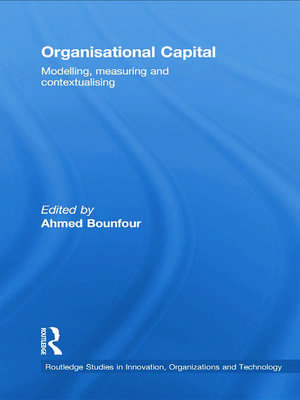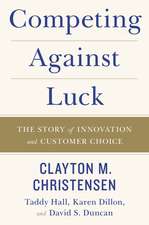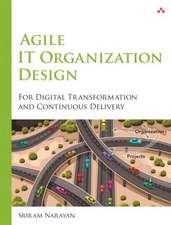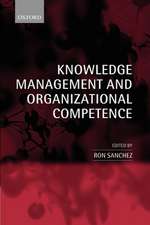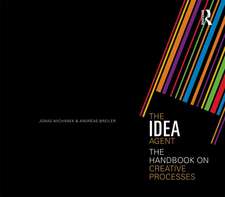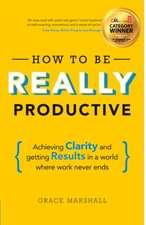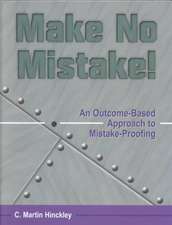Organisational Capital: Modelling, Measuring and Contextualising: Routledge Studies in Innovation, Organizations and Technology
Editat de Ahmed Bounfouren Limba Engleză Paperback – 19 mai 2014
In this book the subject is approached in four ways. Firstly from an analytical perspective: what is the status of organisational capital as a concept and how is the defined; secondly from a ontological perspective: what type of (implicit) orders can be designed and implemented around organisations; thirdly from the measurement perspective: what kind of frameworks and what type of metrics can be prototyped; and finally the implementation perspective: how should organizations integrate the organisational capital perspective in the definition and implementation of their strategies for resources’ allocation. The book provides the first multifaceted and international effort from a broad perspective, aiming at clarifying the concept of organisational capital and determining its analytical and operational implications.
| Toate formatele și edițiile | Preț | Express |
|---|---|---|
| Paperback (1) | 417.20 lei 6-8 săpt. | |
| Taylor & Francis – 19 mai 2014 | 417.20 lei 6-8 săpt. | |
| Hardback (1) | 1549.56 lei 6-8 săpt. | |
| Taylor & Francis – 4 dec 2008 | 1549.56 lei 6-8 săpt. |
Din seria Routledge Studies in Innovation, Organizations and Technology
- 9%
 Preț: 1040.85 lei
Preț: 1040.85 lei - 20%
 Preț: 881.57 lei
Preț: 881.57 lei - 20%
 Preț: 266.51 lei
Preț: 266.51 lei -
 Preț: 311.41 lei
Preț: 311.41 lei -
 Preț: 296.44 lei
Preț: 296.44 lei -
 Preț: 311.18 lei
Preț: 311.18 lei -
 Preț: 296.06 lei
Preț: 296.06 lei - 9%
 Preț: 935.42 lei
Preț: 935.42 lei -
 Preț: 311.48 lei
Preț: 311.48 lei -
 Preț: 311.41 lei
Preț: 311.41 lei -
 Preț: 309.38 lei
Preț: 309.38 lei -
 Preț: 309.79 lei
Preț: 309.79 lei - 18%
 Preț: 1111.51 lei
Preț: 1111.51 lei -
 Preț: 423.58 lei
Preț: 423.58 lei - 18%
 Preț: 1067.84 lei
Preț: 1067.84 lei - 18%
 Preț: 780.08 lei
Preț: 780.08 lei - 18%
 Preț: 1056.28 lei
Preț: 1056.28 lei - 26%
 Preț: 821.65 lei
Preț: 821.65 lei - 18%
 Preț: 1055.51 lei
Preț: 1055.51 lei -
 Preț: 486.38 lei
Preț: 486.38 lei -
 Preț: 418.22 lei
Preț: 418.22 lei - 18%
 Preț: 1106.81 lei
Preț: 1106.81 lei -
 Preț: 318.44 lei
Preț: 318.44 lei - 13%
 Preț: 296.19 lei
Preț: 296.19 lei - 18%
 Preț: 1279.75 lei
Preț: 1279.75 lei - 18%
 Preț: 1059.84 lei
Preț: 1059.84 lei - 18%
 Preț: 1168.37 lei
Preț: 1168.37 lei -
 Preț: 440.69 lei
Preț: 440.69 lei - 16%
 Preț: 278.51 lei
Preț: 278.51 lei - 18%
 Preț: 1121.96 lei
Preț: 1121.96 lei - 18%
 Preț: 1060.87 lei
Preț: 1060.87 lei - 25%
 Preț: 823.08 lei
Preț: 823.08 lei -
 Preț: 440.00 lei
Preț: 440.00 lei - 26%
 Preț: 848.93 lei
Preț: 848.93 lei -
 Preț: 430.37 lei
Preț: 430.37 lei - 18%
 Preț: 1107.61 lei
Preț: 1107.61 lei - 18%
 Preț: 1168.37 lei
Preț: 1168.37 lei -
 Preț: 465.49 lei
Preț: 465.49 lei - 18%
 Preț: 699.96 lei
Preț: 699.96 lei - 18%
 Preț: 1060.19 lei
Preț: 1060.19 lei - 26%
 Preț: 764.20 lei
Preț: 764.20 lei - 18%
 Preț: 1166.68 lei
Preț: 1166.68 lei
Preț: 417.20 lei
Nou
Puncte Express: 626
Preț estimativ în valută:
79.85€ • 83.04$ • 66.82£
79.85€ • 83.04$ • 66.82£
Carte tipărită la comandă
Livrare economică 15-29 martie
Preluare comenzi: 021 569.72.76
Specificații
ISBN-13: 9780415761901
ISBN-10: 0415761905
Pagini: 320
Ilustrații: 104
Dimensiuni: 156 x 234 x 26 mm
Greutate: 0.48 kg
Ediția:1
Editura: Taylor & Francis
Colecția Routledge
Seria Routledge Studies in Innovation, Organizations and Technology
Locul publicării:Oxford, United Kingdom
ISBN-10: 0415761905
Pagini: 320
Ilustrații: 104
Dimensiuni: 156 x 234 x 26 mm
Greutate: 0.48 kg
Ediția:1
Editura: Taylor & Francis
Colecția Routledge
Seria Routledge Studies in Innovation, Organizations and Technology
Locul publicării:Oxford, United Kingdom
Public țintă
Postgraduate and UndergraduateCuprins
Introduction Ahmed Bounfour
Chapter 1: Organizational Capital: Concept, Measure, or Heuristic? JC Spender
Chapter 2: The Power and Frailty of Organisational Capital Jan Mouritsen
Chapter 3: An Intellectual Capital View of Business Model Innovation Goran Roos
Chapter 4: Knowledge, Recognition and "Communautalism" Ahmed Bounfour
Chapter 5: Designing Sequences for Knowledge Exchange:The Hau-Ba Model Ahmed Bounfour and Gwenaëlle Grefe
Chapter 6: Dynamic Capabilities of Communities Ahmed Bounfour
Chapter 7: The Dynamics of Self-renewal: A Systems-thinking to Understanding Organizational Challenges in Dynamic Environments Pirjo Ståhle
Chapter 8: Applying KVA Analysis, Risk Simulation and Strategic Real Options: The Shipyard Case Christine L. Komoroski, Thomas Housel, Sandra Hom and Johnathan Mun
Chapter 9: When IT Does Matter: Setting Up "Value Contracts" Between Stakeholders Yves Caseau
Chapter 10: Mapping Value Creation of Organizational Capital Bernard Marr
Chapter 11: Attention Management in Organizations: Four Levels of Support in Information Systems Claudia Roda and Thierry Nabeth
Chapter 12: Leveraging Organizational Capital for Innovation: The Process of Marketing Knowledge Co-Creation Florian Kohlbacher
Chapter 13: Organisational Capital and Competence Building Anjali Bakhru
Chapter 14: IT, Organisational Capital and The Reporting (Measurement) Issue Ahmed Bounfour
Chapter 1: Organizational Capital: Concept, Measure, or Heuristic? JC Spender
Chapter 2: The Power and Frailty of Organisational Capital Jan Mouritsen
Chapter 3: An Intellectual Capital View of Business Model Innovation Goran Roos
Chapter 4: Knowledge, Recognition and "Communautalism" Ahmed Bounfour
Chapter 5: Designing Sequences for Knowledge Exchange:The Hau-Ba Model Ahmed Bounfour and Gwenaëlle Grefe
Chapter 6: Dynamic Capabilities of Communities Ahmed Bounfour
Chapter 7: The Dynamics of Self-renewal: A Systems-thinking to Understanding Organizational Challenges in Dynamic Environments Pirjo Ståhle
Chapter 8: Applying KVA Analysis, Risk Simulation and Strategic Real Options: The Shipyard Case Christine L. Komoroski, Thomas Housel, Sandra Hom and Johnathan Mun
Chapter 9: When IT Does Matter: Setting Up "Value Contracts" Between Stakeholders Yves Caseau
Chapter 10: Mapping Value Creation of Organizational Capital Bernard Marr
Chapter 11: Attention Management in Organizations: Four Levels of Support in Information Systems Claudia Roda and Thierry Nabeth
Chapter 12: Leveraging Organizational Capital for Innovation: The Process of Marketing Knowledge Co-Creation Florian Kohlbacher
Chapter 13: Organisational Capital and Competence Building Anjali Bakhru
Chapter 14: IT, Organisational Capital and The Reporting (Measurement) Issue Ahmed Bounfour
Notă biografică
Ahmed Bounfour is Professor at The University Paris Sud and the founder and titular of the European Chair On Intellectual Capital Management.
Recenzii
"A rich and encompassing perspective to the topic of organisational capital which highlights in depth insights in the way the knowledge economy functions" Katerina Nicolopoulou (University of Southampton, UK)
Descriere
The most common types of intangible assets are trade secrets (e.g., customer lists and know-how), copyrights, patents, trademarks, and goodwill. This new volume introduces, and critically examines organizational capital as an intangible asset.
